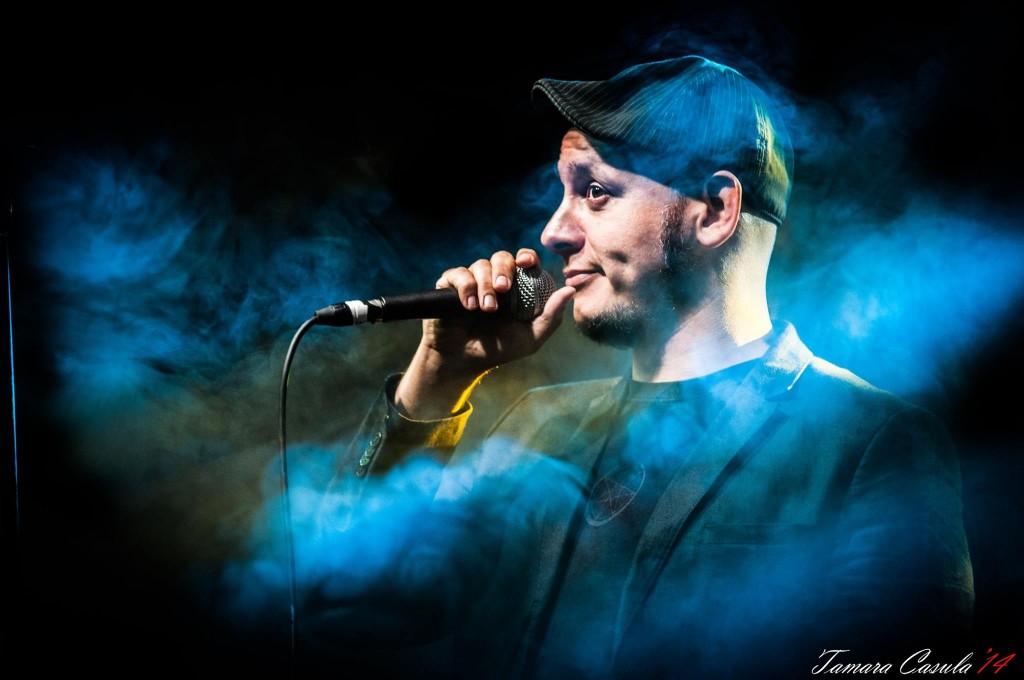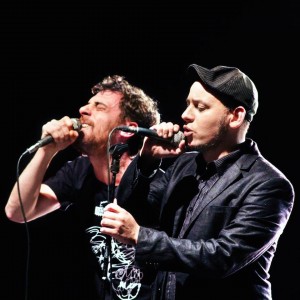DALLA CITTA’ ALLA MUSICA
Intervista a Daniele Coccia, cantautore romano.

1 – I testi dei Surgery e del Muro del Canto hanno toccato più volte il tema della città, penso a “Siamo animali” e a “500” su tutti. In quale zona sei cresciuto e che influenza ha avuto, se ne ha avuto, sul tuo percorso artistico?
Io sono cresciuto e ancora vivo in provincia di Roma. A Guidonia. Questo ha sicuramente influito sul mio percorso personale ed artistico. La mancanza di spazi culturali e aggregativi é stata, negli anni dell’adolescenza, la causa di una sorta di alienazione positiva attorno alle mie passioni: la scrittura e la musica. Una fortunata reazione al nulla circostante. In provincia, rispetto alle grandi città, i ragazzi che approcciano l’arte lo fanno con maggior rabbia e con una passione smodata. In più questa sorta di isolamento, la mancanza di un confronto con altri autori o musicisti, aiuta a sviluppare, spesso, connotati di spiccata originalità. Può non essere il mio caso ma ho molti buoni esempi.
2 – Nella canzone Palazzinari, del vostro ultimo lavoro Ancora ridi si fa riferimento ai quartieri dormitorio della periferia romana e di come questi siano dei recinti di indifferenza e distacco dalla città per chi ci vive… Credi che le periferie facciano davvero parte della città, nonostante siano spesso luoghi smarriti e di smarrimento? Cosa ti ha insegnato la periferia romana in generale?
Qui rispondo in veste di autore e cantante de Il Muro del Canto, specificandoti però che il testo di “Palazzinari” è stato ben scritto da Alessandro Pieravanti (batterista e voce narrante della band). Le periferie dovrebbero far parte della città ma molte di queste effettivamente sono dei satelliti malserviti, dimenticati dalle amministrazioni e lasciati alla deriva. Quelle che, venti o trent’ anni fa erano considerate periferie, sono state fortunatamente assorbite dalla città; crescendo insieme all’ottusità con la quale questo processo é avvenuto. La cosa che ho imparato osservando da vicino queste zone è un risveglio popolare fatto di solidarietà e autogestione. In questi dimenticatoi urbani molta gente si sta adoperando per supplire alla colpevole assenza dello Stato, costruendo il futuro per qualcosa di migliore che vedrá i propri frutti nella Roma di domani.
3 – A volte da alcuni testi come “Erba cattiva”, o “Habitat” e dal video di queste canzoni, la città sembra un luogo tenebroso, un baraccone di specchi deformanti, e le maschere dei Surgery dei “segnali di guerra”. Che differenza c’è in questo caso con la tua esperienza del Muro del Canto?
Ne Il Muro del Canto il linguaggio e l’immaginario cercano di rievocare un passato e una civiltà irrimediabilmente perduta con la globalizzazione. C’è quasi una visione ostinata nella rievocazione di quello che abbiamo perduto: umanità, civiltà e il senso di appartenenza alla comunità. Nei Surgery abbiamo cantato questo declino da vicino facendone vedere le ferite ancora aperte. Le due visioni di città sono completamente diverse. Nella prima si stava con la chiave alla porta, quasi che la città fosse un’estensione della famiglia. Nell’imaginario dei Surgery la città è preda di nuove epidemie alla fine dei giorni e della civiltà umana.
4 – Nei tuoi testi in particolare prevale più un senso di rabbia o di nostalgia?
Le due cose vanno di pari passo. Sono due componenti innate del mio carattere e fortunatamente non le uniche.
5 – Nella recente intervista a Repubblica parli della positività e dell’ironia che contraddistinguono i Romani e gli italiani in generale. Tutto ciò può essere, in fondo, un meccanismo di autodifesa, un modo molto creativo di sconfiggere il male o di oscurarlo…
L’atteggiamento ironico aiuta l’individuo nella vita di tutti i giorni. Aiuta il romano come l’eschimese ma i grossi problemi della gente non possono essere sconfitti sdrammatizzando. L’ironia può aiutarci nelle difficoltà, può renderci amabili agli occhi degli altri, ma non può ricostruire una società né sconfiggere o oscurare il male.
6 – Hai mai immaginato una Roma ideale (e positiva) del futuro? Se sì, dicci come la immagini, se no, dicci perché.
La Roma che vorrei la immagino come ad Agosto, quando tolte dai piedi le migliaia di vetture che ogni giorno l’assaltano sembra tutto più chiaro. Mi piace associare idealmente Roma alla notte; perché di notte è stata cornice di molte belle avventure. Mi piacerebbe ritrovare ancora la città dei vecchi film, la gente di una volta. Non è più così, possiamo rievocarla ma i tempi sono cambiati e a nostro favore abbiamo la nostalgia e l’archeologia. Non vedo un bel futuro perché nel tempo ho conosciuto solo peggioramenti e credo di essere realista a prevederne di ulteriori.

Daniele Coccia ed Elio Germano ; foto: Gloria Angelini
7 – Più volte parlando di architettura abbiamo approfondito il ruolo delle periferie nell’evoluzione del tessuto sociale. Questo tema non sembra toccarti, ma parlando della “maledizione” cioè di un meccanismo immutabile e “magico” in senso negativo, in realtà ti avvicini a quello che noi abbiamo chiamato recentemente “resistenza”: la resistenza al cambiamento di mentalità, a quelle dinamiche sociali (come la chiacchierata da bar) che assorbono tutto e tutti. Vuoi raccontarci di questo perché speri in una presa di coscienza o perché ti affascina in quanto lo consideri una realtà immodificabile?
Una presa di coscienza collettiva a questo punto della storia del nostro paese sarebbe naturale, ma non mi aspetto che questa possa arrivare. Non mi aspetto un cambiamento della mentalità delle persone perché nel sistema presente l’Italiano ha tutto quello che gli é sempre andato a genio: una buona dose di tollerabile corruzione personale, un’ipocrita adesione alle tradizioni correnti e un senso dell’avvenire che sopravvive alla giornata costruendo un baratro per le generazioni che verranno.
8 – Sempre più violente manifestazioni sociali, anche a Roma, sembrano andare nel senso della “resistenza”. Pensi che le nostre città devono trovare una via “resiliente” cioè divenire capaci di duttilità per assorbire delle spinte distruttrici, o pensi che sia proprio la capacità tutta romana di “buttarla in caciara” l’arma segreta che assicurerà il perdurare di questa situazione?
Io non vedo resistenza in giro. Quelli che lottano sono una sparuta minoranza e qualche volta vincono qualche battaglia. Dovremmo intraprendere una vera e propria guerra a sostegno della riorganizzazione della vita moderna e a favore di una sopravvivenza dignitosa garantita: la casa, il lavoro, la qualità dell’aria, delle acque, del suolo e dei cibi, dell’istruzione e della sanità. Una guerra da affrontare con tutto il popolo e non con solo quelli che storicamente “resistono”. A buttarla in caciara ci pensano dall’alto. Dal basso glielo permettono. La spinta distruttiva è sicuramente in vantaggio rispetto al buon senso.
9 – Dicci quale sarà il prezzo sociale di tutto questo.
Il prezzo sociale è la depressione di ogni impulso verso lo sviluppo di una attività individuale e verso la procreazione. Certe politiche stanno estinguendo gli Italiani. Non so esattamente quale delle due personalità abbia risposto a questa domanda e non credo di vedere nessuno pronto con l’antidoto… almeno per i prossimi anni.
Orazio Caruso
Sebastian Di Guardo
FROM CITY TO MUSIC
Interview to Daniele Coccia, roman songwriter.
1 – The lyrics of Surgery and Il Muro del Canto concerned several times the theme of the city, I think of ‘Siamo animali’ (‘We are animals’) and ‘500’ above all. In what place did you grow up and what about its influence, if so, over your artistic career?
I grew up and still live in Province of Rome. In Guidonia. This has definitely influenced over my personal life and artistic career. The absence of cultural and meeting spaces has been, in the adolescence, the cause of a sort of positive alienation around my passions: writing and music. A fortunate reaction against the surrounding nothingness. In province, compared to big cities, young people who approach art do it with bigger fury and excessive passion. Moreover this sort of isolation, the lack of an exchange of views with other authors or musicians often help to develop very original features. Maybe it’s not my case, but I’ve got a lot of good examples.
2 – The song ‘Palazzinari’ (‘Apartment Blocks Builders’), in your last album ‘Ancora ridi’ (‘You Still Laugh’), refers to dormitory suburbs of Rome and how those are fences of indifference and detachment from the rest of the city for those who live there… Do you think suburbs are part of the city, although they are often lost and dismay places? What did suburbs of Rome teach you in general?
I answer this question acting as author and singer of Il Muro del Canto, specifying that Alessandro Pieravanti (drummer and narrator of the band) did write the lyrics of ‘Palazzinari’. Suburbs should be part of the city, but many of these are actually poorly served adrift satellites, forgotten by the Government. Those places which twenty or thirty years ago were considered suburbs have been fortunately absorbed by the city, growing up together with the stupidity of this process. What I’ve learnt by watching closely these areas is a popular awakening made of solidarity and self-management. In these urban oblivions many people are working to make up for the guilty absence of the Government, building the future for something better which will bear fruit in the Rome of tomorrow.
3 – Sometimes in some lyrics, such us ‘Erba cattiva’ (‘Weed’) or ‘Habitat’ as well as their videos, the city seems a gloomy place, a sideshow of distorting mirrors, and the masks of Surgery ‘signs of war’. What is the difference in this case with your experience in Il Muro del Canto?
In Il Muro del Canto the language and the imaginary try to commemorate a past and a civilization which are irremediably lost ‘cause of globalization. There is almost an obstinate commemoration of what we have lost: humanity, civilization and sense of belonging to community. In Surgery we sang closely this decline showing its still open wounds. Two completely different visions of the city. In the first one you used to leave your door key on, almost like the city were an extension of the family. In the Surgery’s imaginary the city is in the grip of new epidemics at the end of human civilization’s days.
4 – What is in your lyrics more dominant, a sense of fury or nostalgia?
Both of them go hand in hand. They are innate part of my character and fortunately not the only ones.
5 – In the recent interview for La Repubblica you talk about positivity and irony which mark Romans and Italians in general. All this can be, after all, a mechanism of self-defence, a very creative way to defeat evil or obscure it…
Ironic approach helps individual in his everyday life. It helps the Roman as well as the Eskimo, but the big problems of people cannot be defeated by minimizing. Irony can help us for problems, can make us lovable in the eyes of others, but cannot rebuild a society, nor defeat or obscure evil.
6 – Have you ever imagined an ideal (and positive) Rome of the future? If so, please, tell us how you imagine it, if not, tell us why.
I imagine my ideal Rome like in August, when, without the thousands of cars which everyday storm it, everything is clearer. I like to ideally associate Rome to the night, because by night it has been frame of many nice adventures. I’d like to find still the city of the old films, the old people. It’s not like this anymore, we can commemorate it, but times have changed and in our favour we have nostalgia and archeology. I don’t see any good future because in the time I have known only worsening and I think to be realistic to envisage further.
7 – Several times talking about architecture we explored the role of suburbs in the evolution of social fabric. This theme seems not to concern you, but talking about ‘curse’, an immutable and ‘magic’ mechanism in the negative, actually you approach what we have recently called ‘resistance’: resistance to mentality change, to those social dynamics (like bar chats) that absorb everything and everybody. Do you want to tell us about this ‘cause you hope in awareness or because it fascinates you as you consider it an immutable reality?
A collective awareness at this point of the history of our Country should be obvious, but I haven’t got any expectation about. I don’t expect any mind-changing because in the present system the typical Italian has got all that all along sits well with him: a good dose of endurable personal corruption, a hypocritical adhesion to current traditions and a sense of future which survives hand-to-mouth building a chasm for generations to come.
8 – Increasingly violent social demonstrations, also in Rome, seem to go in the direction of “resistance.” Do you think that our cities have to find a “resilient” way that is becoming capable of adaptability to absorb destructive pushes, or do you think the secret weapon which will ensure the continuation of this situation is just the Roman ability to skirt the matter?
I can’t see any resistance around. Those who struggle are a small minority and sometimes they win some battles. We should start a real war in support of the reorganization of modern life and in favor of a decent guaranteed life: house, job, quality of air, water, soil and food, education and health. A war to deal with all the people, not just with those who historically ‘resist’. From above they skirt the matter. Bottom allows. The destructive push is definitely ahead compared to common sense.
9 – Please tell us what will be the social price of all this.
The social price is the depression of each impulse to the development of an individual activity and to procreation. Certain policies are extinguishing the Italians. I don’t know exactly which of the two personalities have answered this question and I reckon not to see anyone ready with the antidote… at least for the next few years.
Orazio Caruso
Sebastian Di Guardo
traslations by Luigi Cavallo
